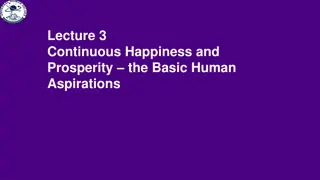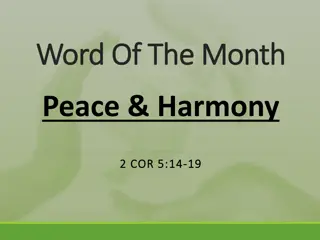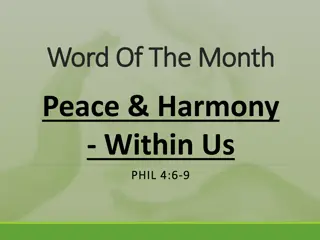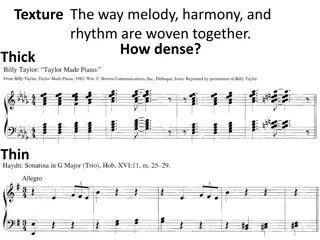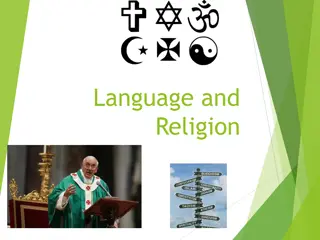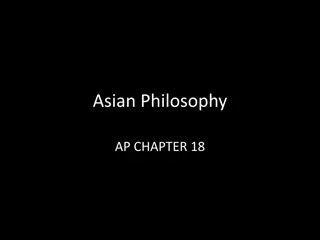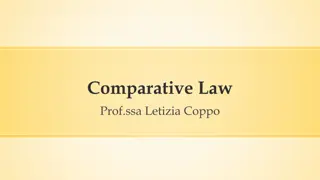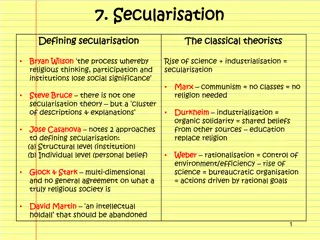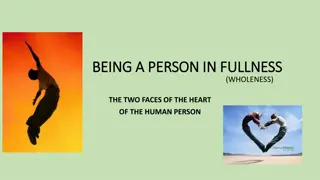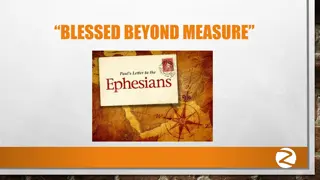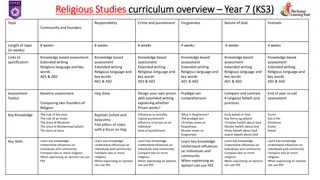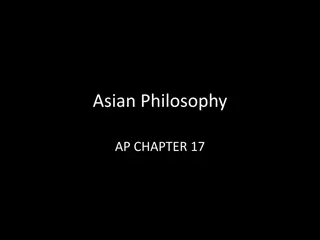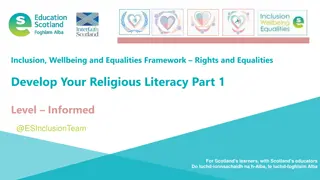Understanding Interfaith Harmony in Islamic Education
The third meeting conducted by the Islamic Education Faculty covered topics such as classroom regulations, tolerance among different religions, the concept of harmony among religious communities, and general challenges related to diversity in religious interpretations. The importance of maintaining
2 views • 13 slides
EU- Erasmus-Harmony Project Conference and Review Meeting.
Explore the EU Erasmus Harmony Project Conference and Review Meeting at Vellore Institute of Technology, Chennai, India in April 2023. This event showcases internationalization initiatives, partnerships, collaborations, long-term mobility opportunities, dual-degree programs, and academic collaborati
0 views • 25 slides
Status of Family Laws in India: Hindu vs. Religious Minorities
The family and personal status laws in India vary between Hindu law and those pertaining to religious minorities. While Hindu law has seen extensive reforms, discriminatory provisions still exist. In contrast, laws governing religious minorities have undergone fewer reforms, leading to greater inequ
2 views • 4 slides
Understanding Religious Conflict: Definition and Types Explored
Religious conflict is a complex and recurring concept throughout history. Scholars have defined it as disagreements between religious groups. This conflict arises from contentious issues touching on ideology, morality, power, and identity, influenced by various socio-political, economic, and cultura
1 views • 13 slides
Evolution of Akbar's Religious Policy: A Historical Overview
In the 16th century, Akbar the Great implemented a revolutionary religious policy in the Mughal Empire. Initially a devout Sunni Muslim, Akbar evolved his stance to promote harmony and equality among all religions, fostering tolerance and understanding. This shift marked a significant departure from
1 views • 25 slides
Exploring Continuous Happiness and Prosperity: Human Aspirations
Dive into the fundamental desires of humanity for happiness, prosperity, and their continuity. Reflect on internal dialogue, the concept of harmony and synergy, and the importance of maintaining harmony across different levels of existence for enduring happiness.
0 views • 30 slides
Elizabethan Religious Settlement: Unity Amidst Division
Amid religious division in England, Queen Elizabeth I implemented a Religious Settlement in 1559 to unify the country. The settlement, a blend of Protestant and Catholic elements, aimed to maintain peace and prevent rebellions. Elizabeth's strategic compromise pleased most people, though lingering t
0 views • 14 slides
Understanding Secularism: Principles and Advantages
Secularism is the principle of separating government institutions from religious entities to ensure equal rights for believers and non-believers. It safeguards freedom of religious belief and practice, upholds religious freedom, and promotes democracy and fairness. Secularism aims to prevent religio
0 views • 21 slides
Understanding the Concept of Welfare in Islam
Islam, as a religion, emphasizes welfare and harmony. The word "Islam" itself means protection, safety, reconciliation, and peace. It promotes peace, submission, harmony, and grandeur, encompassing all aspects of life - social, political, economic, and personal. The concept of Islam as a complete wa
0 views • 18 slides
Finding Peace and Harmony Through Reconciliation with God
Discover the path to peace and harmony through reconciliation with God. Explore lessons on inner peace, harmony with others, and overcoming enmity with God. Through the sacrificial death of Jesus, we are justified by faith, at peace with God, and offered redemption. Embrace the journey towards harmo
0 views • 11 slides
Understanding Religious Language: Cognitivism vs. Non-Cognitivism in the University Debate
This discussion explores the debate between cognitivism and non-cognitivism in religious language. Cognitivism asserts that religious claims aim to describe the world and can be true or false, while non-cognitivism argues that such claims express attitudes and cannot be verified. Flew's challenge qu
0 views • 9 slides
Principles and Elements of Interior Design Explained
Explore the fundamental principles of interior design, including proportion, rhythm, emphasis, balance, scale, and harmony. Delve into the significance of scale, proportion, rhythm, emphasis, balance, and harmony in creating cohesive and visually appealing spaces. Discover how design elements like s
0 views • 18 slides
Harmony High School Senior Parent Night Presentation 2022
Harmony High School's Senior Parent Night Presentation for the academic year 2021-2022 provides detailed information about the school administration, guidance services, graduation requirements, SAT testing, college applications, and more. The presentation covers essential details for students and pa
0 views • 19 slides
Seeking Peace and Harmony Amidst Internal Conflicts
Amidst societal chaos and internal conflicts, the message of peace and harmony is emphasized through reflections on scripture, music, and societal commentary. Encouragement is given to seek God's peace, surpassing understanding, in the face of anxiety and turmoil.
0 views • 12 slides
Guide to Using the BSA Calendar of Religious Observances
The BSA Calendar of Religious Observances is a valuable resource for scheduling scouting events in consideration of various religious holidays and observances. This guide provides an overview of the calendar, highlights important dates, and emphasizes the importance of respecting religious diversity
0 views • 8 slides
Exploring Textures in Music: Melody, Harmony, and Rhythm
Dive into the intricacies of musical textures where melody, harmony, and rhythm intertwine in various ways such as monophonic, polyphonic, homophonic, and chordal textures defining the density and range of musical compositions.
0 views • 31 slides
Understanding Liver Detoxification and Harmony in Traditional Chinese Medicine
The liver plays a crucial role in detoxification and maintaining harmony in the body according to Traditional Chinese Medicine (TCM). Issues like liver disharmony can lead to various symptoms and health conditions. TCM emphasizes the importance of supporting liver function for overall well-being by
0 views • 21 slides
Understanding the Role of Language in Religion
Exploring the significance of language in religious contexts, this content discusses the functions, features, lexicon, grammar, and metaphorical aspects present in religious language. It delves into how religious language upholds spiritual beliefs, persuades believers, and expresses specific attitud
0 views • 8 slides
Understanding the Cultural Dimensions of Food and Religious Influences in Culinary Arts
Explore the impact of religious beliefs on food traditions and dietary restrictions across different cultures in the culinary world. Learn about the influence of major world religions on eating habits, food choices, and culinary practices. Discover how various religious groups, such as Christians, o
0 views • 26 slides
Exploring Daoism: Harmony, Nature, and Peace
Daoism, a philosophical view originating during the Warring States Period, emphasizes living in harmony with nature to achieve peace and well-being. Laozi, the supposed founder, advocated simplicity, minimizing desires, and embracing the natural way of life. The core text, Daodejing, guides follower
0 views • 18 slides
The Vital Role of Religious Institutions in Supporting Immigrants
Religions and immigration are interlinked in modern societies, where religions play a significant role in providing services, defending rights, and supporting the social cohesion of immigrants. Mainstream religious institutions serve as key actors in offering assistance, advocating for migrant right
2 views • 14 slides
Understanding Religious Language: Flew, Hare, Mitchell
Exploring the contrasting views of cognitivism and non-cognitivism in the context of religious language through the perspectives of Flew, Hare, and Mitchell. Delve into Flew's challenge on the undetectable gardener, Hare's concept of bliks, and Mitchell's response to the rationality of religious bel
0 views • 7 slides
Religious Accommodation in the Army: Advising Command
The content discusses the role of the Chaplain Corps in advising Soldiers and leaders on religious accommodation in the Army as of February 13, 2019. It covers learning objectives, legal foundations, Army policies, procedures, recent changes, and references related to religious accommodation. The in
0 views • 36 slides
Chinese Law: A Historical Perspective on Harmony and Legal Principles
Chinese law reflects a unique approach to social order and harmony deeply rooted in Confucian teachings. The concept of cosmic harmony and the emphasis on societal roles are central to understanding the legal framework in ancient China. Legal principles such as Li and Fa governed social behavior bas
0 views • 22 slides
Understanding Religious Discrimination Laws in California Workplace
Learn about the regulations and protections under FEHA and Title VII in California, including religious exemptions, accommodation requirements, case studies, and best practices to address discrimination issues effectively. Discover the statistical insights on religious discrimination complaints and
0 views • 45 slides
Exploring Harmony in Nature: Artistic Reflections and Book Discussion
Explore the concept of harmony in nature through a collaborative collage artwork called "Tree of Harmony" and the book "The Great Kapok Tree" by Lynne Cherry. Discover how different species can coexist peacefully and the impact of deforestation on wildlife. Engage in thought-provoking discussions ab
0 views • 10 slides
Understanding Secularisation: The Decline of Religious Influence in Society
Secularisation refers to the process in which religious thinking, participation, and institutions lose their social significance. This phenomenon is influenced by factors such as the rise of science, industrialisation, changing social attitudes, and the disengagement of the church from society. Evid
0 views • 8 slides
Philosophers' Views on Religious Experience: Insights and Critiques
This lesson delves into the perspectives of various philosophers such as Rudolph Otto, Richard Swinburne, John Hick, and Michael Persinger on religious experiences. It explores concepts like the numinous, religious knowledge, God's existence, and criticisms on the validity of religious experiences.
0 views • 7 slides
Philosophers' Views on Religious Experience: Insights from William James
Explore William James' perspective on religious experiences, including his views on existential and value judgments. Understand how James argued for the validity of religious experiences and their potential proof of God's existence. Delve into the implications of emotions and prior beliefs on interp
0 views • 7 slides
Religious and Social Conflicts Fueling the Rise of Absolutism in Europe
Social, economic, and religious conflicts in Europe played a significant role in the emergence of absolutism where monarchs wielded supreme power without sharing it with legislative bodies. Events like Spain's religious conflicts, Protestantism in England, the Spanish Armada, religious conflict in t
0 views • 10 slides
Religious Pluralism and Civil Society: A Paradox in Government Control
Understanding the intricacies of religious pluralism in the context of government control reveals a paradox where restricting religion can hinder social cohesion and economic growth. Through insights on the counterproductivity of control, the role of religious organizations in civil society, and the
0 views • 16 slides
US Religious Freedom Restoration Act (RFRA) Overview
The US Religious Freedom Restoration Act (RFRA) aims to protect the free exercise of religion by ensuring that governments do not substantially burden religious practices without compelling justification. It emphasizes striking a balance between religious liberty and governmental interests through t
0 views • 9 slides
Implementing Yamaha Harmony Director for Music Education Success
Implementing the Yamaha HD-200 Harmony Director keyboard in music education has proven successful in improving harmony, intonation, rhythm, and timing skills efficiently within a limited time frame. By using this innovative teaching tool, the music department has seen noticeable enhancements in stud
0 views • 12 slides
Understanding Personal Growth and Harmony in Human Existence
Exploring the concept of being a person in fullness, with two faces of the human heart - one representing reality and wounds, the other potential and positivity. The interaction between these aspects shapes one's identity, purpose, and journey towards personal growth and spiritual harmony. Embracing
0 views • 20 slides
Blessed Beyond Measure - Reflections on Humility, Harmony, and Unity
Explore the profound teachings on humility, harmony, and unity as found in Ephesians 4:1-6 and Colossians 3:12. Dr. Mark Tolbert shares insights on walking in a manner worthy of our calling, emphasizing the importance of compassion, kindness, and gratitude. Reflect on the significance of unity in Ch
0 views • 8 slides
Unity and Harmony Chants for Peace and Learning
Explore a collection of chants and songs promoting unity, harmony, and peace. The content includes Niphal Verb Stem, a Shema lullaby, Alphabet Song, Vanquishing the Vowel, Qal Perfect Chant, Noun Chant, and more. These chants emphasize the importance of togetherness and understanding in various ling
0 views • 102 slides
Religious Studies Curriculum Overview for Year 7 and 8 (KS3)
Explore various topics such as responsibility, crime and punishment, forgiveness, nature of God, festivals, community, founders, worship, creation, life after death, rules and laws, relationships in this detailed Year 7 and 8 (KS3) Religious Studies curriculum. The curriculum includes assessments, e
0 views • 6 slides
Development of Confucianism in Ancient China
During the Warring States Period in ancient China, Confucianism emerged as a response to the chaos and societal collapse. Confucianism, along with other philosophies like Daoism, Legalism, and Mohism, offered different solutions to restore order and harmony in society. Key figures like Mengzi and Ha
0 views • 27 slides
Developing Religious Literacy for Educators in Scotland
This resource aims to enhance educators' understanding of religious literacy by exploring religious discrimination, core beliefs of major faiths, and additional learning sources. It encourages educators to consider the needs of learners in relation to their religious beliefs in Scotland.
0 views • 30 slides
Settling the Northern Colonies: Religious Transformation and Colonization
The Protestant Reformation led to the emergence of Puritanism in the Northern Colonies, with figures like Martin Luther and John Calvin shaping religious beliefs. The Massachusetts Bay Colony stood as a beacon of self-government and religious ideals, while dissenters like Anne Hutchinson and Roger W
0 views • 9 slides





